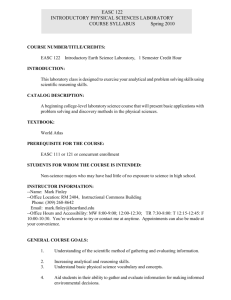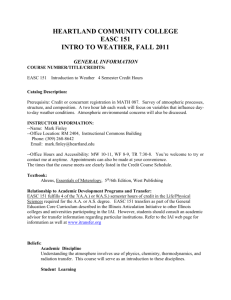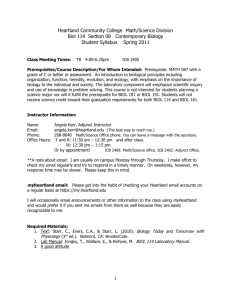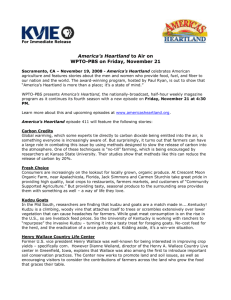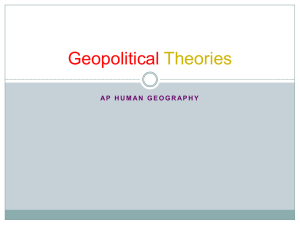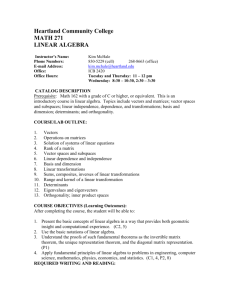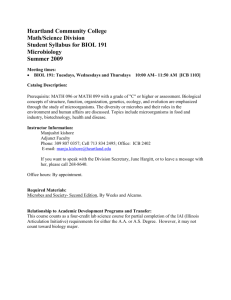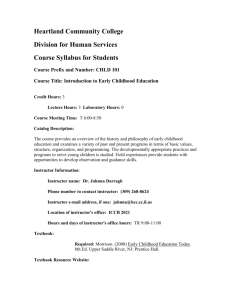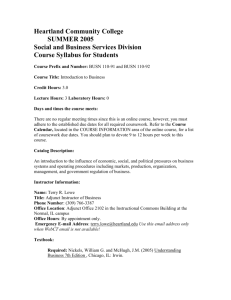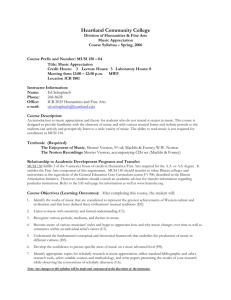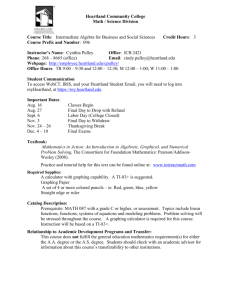EASC 111 Beach-Davis - Heartland Community College
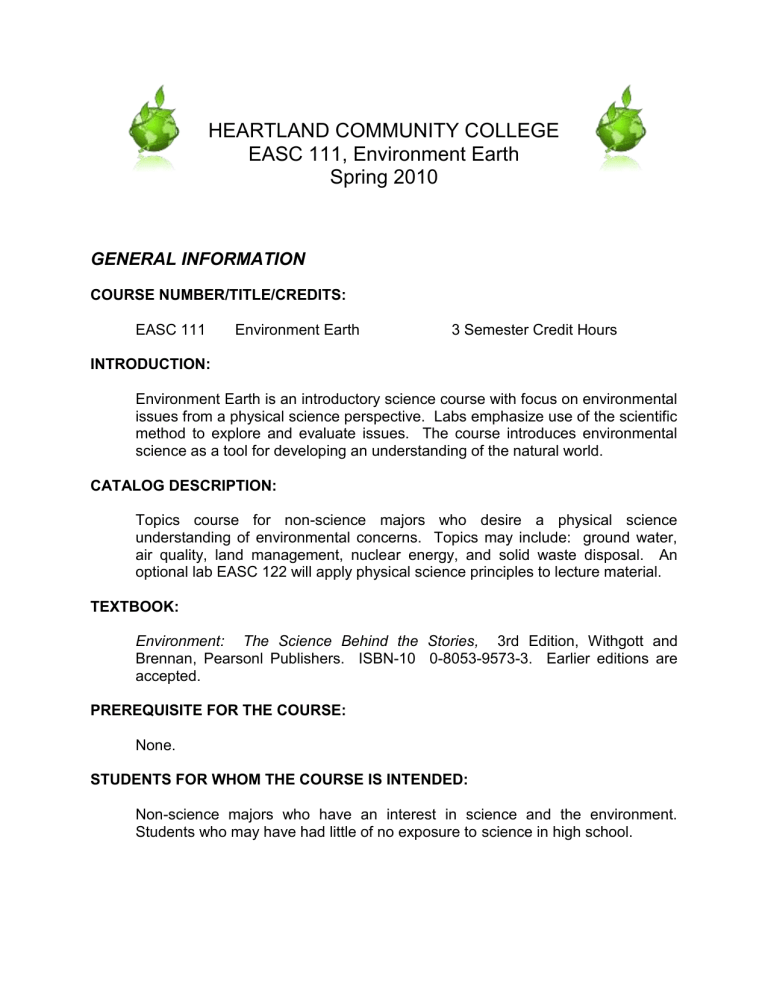
HEARTLAND COMMUNITY COLLEGE
EASC 111, Environment Earth
GENERAL INFORMATION
Spring 2010
COURSE NUMBER/TITLE/CREDITS:
EASC 111 Environment Earth 3 Semester Credit Hours
INTRODUCTION:
Environment Earth is an introductory science course with focus on environmental issues from a physical science perspective. Labs emphasize use of the scientific method to explore and evaluate issues. The course introduces environmental science as a tool for developing an understanding of the natural world.
CATALOG DESCRIPTION:
Topics course for non-science majors who desire a physical science understanding of environmental concerns. Topics may include: ground water, air quality, land management, nuclear energy, and solid waste disposal. An optional lab EASC 122 will apply physical science principles to lecture material.
TEXTBOOK:
Environment: The Science Behind the Stories, 3rd Edition, Withgott and
Brennan, Pearsonl Publishers. ISBN-10 0-8053-9573-3. Earlier editions are accepted.
PREREQUISITE FOR THE COURSE:
None.
STUDENTS FOR WHOM THE COURSE IS INTENDED:
Non-science majors who have an interest in science and the environment.
Students who may have had little of no exposure to science in high school.
INSTRUCTOR INFORMATION:
Name: Janet Beach Davis
Office: ICB 1006
Phone: (309) 268-8513
Email: janet.beach-davis@heartland.edu
Website: http://employee.heartland.edu/jbeachd/
Office Hours- at Raab Road Campus- M-F 8-4 generally. Feel free to call my office or email if you have any questions. At Lincoln CampusI will be on campus one hour before class and will stay after until all questions are answered.
GENERAL COURSE GOALS:
1. Understanding of the scientific method of gathering and evaluating information.
2. Develop an ability to use science as a tool for understanding the natural world.
3. Understand basic physical science vocabulary and concepts.
4. Develop a physical science understanding of areas of environmental concern in the following areas: a. Fossil and nuclear energy b. Soil conservation and agricultural methods c. Air quality d. Solid and toxic wastes e. Water resources f. Ecosystems g. Populations
5. Aid students in their ability to gather and evaluate information for making informed environmental decisions.
RELATIONSHIP OF COURSE TO STUDENT ACADEMIC DEVELOPMENT:
Environment Earth provides a basic science foundation necessary for further college-level courses.
RELATIONSHIP OF COURSE TO GENERAL EDUCATIONAL REQUIREMENTS:
This class will fulfill science credit in the A.A. and A.S. degree requirements.
EDUCATIONAL BELIEFS
BELIEFS ABOUT THE DISCIPLINE:
Physical sciences increase your awareness of the world around you. This will contribute to your being a more informed world citizen, allowing you to better carry out your stewardship responsibilities.
BELIEFS ABOUT STUDENT LEARNING:
Students must take an active role in the learning process or it will not take place.
Desire and effort are the key ingredients in student success.
BELIEFS ABOUT TEACHER'S ROLE:
I'm responsible for fostering an atmosphere conducive to learning, always keeping in mind that the ultimate objective is to develop student interest and transfer knowledge.
CONTENT OUTLINE
TOPIC OUTLINE FOR THE COURSE:
1. Scientific Principles
2. Ethics and Decision Making
3. Ecology
4. Energy exploitation and resources
5. Agricultural Concerns: Soil & Pest Management
6. Water Resources Management
7. Air Pollution
8. Solid Waste Management
9. Hazardous Waste
RATIONALE FOR COURSE CONTENT:
Course content covers science fundamentals and basic laboratory techniques necessary for more advanced science courses. This class also emphasizes the importance of science in evaluating and finding solutions for current and future environmental concerns.
DESCRIPTION OF INSTRUCTIONAL TECHNIQUES AND RATIONALE:
Lectures and discussions. Students will have the opportunity to ask questions and contribute to discussion throughout.
DESCRIPTION OF LEARNING FORMAT:
Following these steps will assist the student in achieving success:
A. Attend class regularly.
B. Participate in class discussions and activities. Your ideas and thoughts are important.
C. Ask questions when you don't understand or need something clarified. It's a smart idea to take an active role in the learning process.
D. Read the assigned material in the textbook before class. Read the material again after the lecture for clarification and reinforcement of main ideas.
E. Review class notes.
F. Review the objectives and key terms listed at the beginning of the chapter and work the review exercises at the end of the chapter.
H. Ask questions on any material that needs clarifying.
FEEDBACK AND GRADING
GRADING SYSTEM/METHOD OF EVALUATION:
Scale: >90% A, 89-80 B, 79-70 C, 69-60 D, <60 F. Five tests are planned and you will be allowed to drop your lowest test score. No test make-ups will be given, if you miss a test that is the score that will be dropped. Quizzes, daily work, activities, and presentations will be the remainder of the points. The breakdown is as follows:
5 tests (one dropped)
In class presentation
14 Weekly quizzes
Chapter homework (23)
Debate
In-class work
100 points each 400 points
50 points
10 points each
5 points each
50 points
As assigned
50 points
140 points
115 points
50 points
Additional information on projects/presentations will be given in class.
POLICIES ON ASSIGNMENTS/TESTS/MAKEUPS/OTHER:
All of the above mentioned must be completed or a score of zero will be recorded for that item. No makeup tests will be given , if you miss a test that will be the test that you drop. If prior arrangements are made, tests can be taken in the testing center for valid reasons. If you are not in class that day, you cannot makeup class work. Field Trips cannot be made up due to the nature of the experience and lack of time.
NO TEXT MESSAGING OR CELL PHONE USE DURING CLASS . If your cell phone rings in class, you will lose all points for the day. If any cell phone abuse is discovered all cell phones will be collected at the beginning of each class and returned after class for the rest of the semester. If my cell phone rings during
class, everyone gets 5 point extra credit that day.
POLICIES ON ATTENDANCE:
Regular class attendance is an important part of educational success and is expected of all students. Since this section only meets once per week, missing a day of class is equivalent to missing a week in your other sections. Attendance will be taken randomly throughout the semester and may be recorded during any or all of the three hours of a Monday meeting. You must be present when attendance is taken to be counted.
There is a very strong correlation between attendance and grade received. You are responsible for all missed lecture material. No test makeups or field trip makeups.
Notice of Cancelled Class Sessions
Cancelled class sessions, for all HCC classes, will be listed under Cancelled Class Meetings in the A-Z Index and under Academic Information in the Current Students page on the HCC Web site. Go to http://www.heartland.edu/classCancellations/ to learn what classes have been cancelled for that day and the upcoming week. Be sure to check the last column, which might contain a message from the instructor.
Academic Integrity
Academic integrity is a fundamental principle of collegial life at Heartland Community
College and is essential to the credibility of the College=s educational programs.
Moreover, because grading may be competitive, students who misrepresent their academic work violate the right of their fellow students. The College, therefore, views any act of academic dishonest as a serious offense requiring disciplinary measures, including course failure, suspension, and even expulsion from the College. In addition, an act of academic dishonesty may have unforeseen effects far beyond any officially imposed penalties.
Violations of academic integrity include, but are not limited to cheating, aiding or suborning cheating or other acts of academic dishonesty, plagiarism, misrepresentation of data, falsification of academic records or documents and unauthorized access to computerized academic or administrative records or systems. Definitions of these violations may be found in the college catalog.
Plagiarism
Plagiarism i s the presenting of other’s ideas as if they were your own. When you write a paper, create a project, do a presentation or create anything original, it is assumed that all the work, except for that which is attributed to another author or creator, is your own.
Plagiarism is considered a serious academic offense and may take the following forms:
1. Copying word-for-word from another source and not giving that source credit.
2. Paraphrasing the work of another and not giving that source credit.
3. Adopting a particularly apt phrase as your own
4. Using an image or a copy of an image without crediting its source
5.
Paraphrasing someone else’s line of thinking in the development of a topic as if it were your own.
6. Receiving excessive help from a friend or elsewhere, or using another project as if it were your own.
Note that word-for-word copying is not the only form of plagiarism.
The penalties for plagiarism may be severe, ranging from failure on the particular piece of work, failure in the course or expulsion from school in extreme cases.
[Adapted from the Modern Language Association’s MLA Handbook for Writers of
Research Papers. New York: MLA, 1995: 26]
SUPPORT SERVICES:
Heartland Library Information www.hcc.cc.il.us/library
The Library, located within the Academic Support Center (ASC) on the Normal campus, provides Heartland students with a variety of on-campus resources that support both class work and personal inquiry. These include: reference tools (print and non-print), periodicals, audio-visual materials and equipment, reserves, a general circulating collection, and a fiction collection. Computer terminals provide access to various electronic resources, including Academic Universe, FirstSearch, and EbscoHost databases; CARL online card catalog, and Internet access. Several electronic resources are accessible from computers off campus. Students may borrow books from the fiction and general collections and may renew materials, in person or by phone, if requests have not been placed on them.
Heartland students also have Interlibrary Loan privileges from Heartland Library. Items usually take 1 to 3 weeks from date of the order to arrive.
The Library maintains a quiet study environment. Assistance is available for all library and information needs. Heartland Library is open Monday-Thursday 7:30 a.m. to 9:30 p.m., Friday 7:30 a.m. to 4 p.m., when the college is in session, but is closed on holidays that Heartland observes. Intersession and summer hours are reduced.
Milner Library at Illinois State University is a public institution so you may use their collection on site. If you want to request to check out materials, ask for a free
Community Borrowers card application at the Milner Library circulation desk. It is important that you have specific titles to request for check out when you apply for the card. The card will give you access to their circulating collection for three months, with a four week check out period. To qualify for this service you must live within 50 miles of
Milner, have a current state ID (driver's license) with current address on ID, and be over age 18. After you fill out the application Milner will perform a background check on you for over due books, etc.
For more information about Library services please call the Library at 268-8200.
TUTORING AND ACADEMIC SUPPORT:
Heartland Community College offers learning assistance in various forms at no cost to
Heartland students at the Academic Support Center (ASC) in Normal and at the Pontiac and Lincoln Centers. Tutors are available at convenient times throughout the week.
Study groups, group tutoring facilitated by a specially-trained tutor, are also available by request. Help is also provided through instructional materials, study skills workshops, open computing, and the Library. For more information about services available at each location, please call the ASC in Normal at (309) 268-8235; the Pontiac Center (815)
842-6777; or the Lincoln Center (217) 735-1731.
CURRICULAR AND TRANSFER STATUS
DEGREE/CERTIFICATE:
This course counts towards completion of the A.A. Degree or the A.S. Degree.
TRANSFERABILITY:
Check with an advisor to get specific transfer information related to the school you wish to attend.
DATES FOR EXAMS/QUIZZES:
Exams will be given as soon as possible after each section is completed.
CALENDAR
This outline should give you a fair idea of the course content. However this outline is subject to modification during the semester
EASC 111- 07 Spring 2010 Class Schedule
Topics
Introduction to class- Scientific Principles
Ethics and Decision Making
Energy- Unit 1 test
Ecology (Debate #1)
Population
Agriculture & Soil
Unit 2 test- Biodiversity
Urbanization/ Management (Debate #2)
Reading
Chapters 1
Chapters 2, 3
Chapter 4
Chapters 5, 6,
Chapters 7,8,
Chapters 9, 10
Chapters 11
Chapter 12, 13,
Date
Week 1-Jan 12
Week 2- Jan 19
Week 3- Jan 26
Week 4- Feb 2
Week 5- Feb 9
Week 6-Feb 16
Week 7- Feb 23
Week 8- March 2
SPRING BREAK
Water Resources
Unit 3 test
Air Pollution and Atmosphere (Debate #3)
Energy Exploitation
Renewable energy- Unit 4 test
Sand County Almanac Week 9- March 9
Chapters 15, 16 Week 10- March 16
Week 11-March 23
Chapters 17, 18
Chapters 19, 20,
Chapter 21
Hazardous and Solid Waste/Risk Assessment Chapters 14, 22
Sustainability
Unit 5- Test only
Chapter 23
Week 12- April 6
Week 13- April 13
Week 14- April 20
Week 15 –April 27
Week 16- May 4
Finals- May 11
Class materials, outlines, notes, study guides, etc will be posted on my website as they become available. http://employee.heartland.edu/jbeachd/
